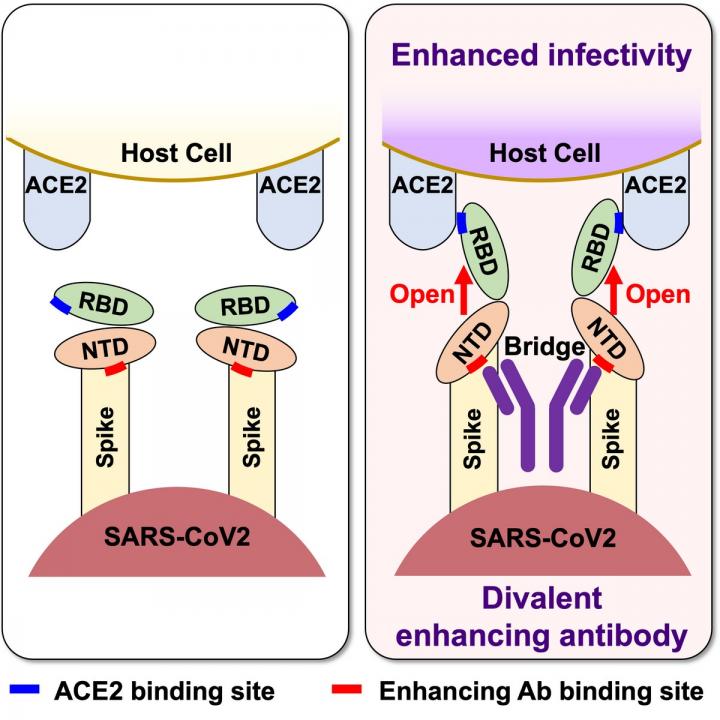Osaka University researchers find that infection with SARS-CoV-2 produces not only neutralizing antibodies that prevent infection, but also antibodies that enhance infection (infection-enhancing antibodies)

Credit: Cell Press
A research group from Osaka University led by Professor Hisashi Arase and consisting of researchers from the Research Institute for Microbial Diseases, the Institute for Protein Research, the Immunology Frontier Research Center, the Center for Infectious Diseases, and the Graduate School of Medicine has discovered for the first time that both neutralizing antibodies that protect against infection as well as infection-enhancing antibodies that increase infectivity are produced after infection with SARS-CoV-2 by analyzing antibodies derived from COVID-19 patients.
Antibodies against the receptor binding site (RBD) of the SARS-CoV-2 spike protein play an important function as neutralizing antibodies that suppress SARS-CoV-2 infection by inhibiting its binding to the human receptor, ACE2. On the other hand, the function of antibodies against other sites of the spike protein was unknown.
“We found that when infection-enhancing antibodies bind to a specific site on the spike protein of SARS-CoV-2, the antibodies directly cause a conformational change in the spike protein, resulting in the increased infectivity of SARS-CoV-2. Neutralizing antibodies recognize the RBD, whereas infection-enhancing antibodies recognize specific sites of the N-terminal domain (NTD),” explains Professor Hisashi Arase. “Furthermore, the production of infection-enhancing antibodies attenuated the ability of neutralizing antibodies to prevent infection.”
Higher production of infection-enhancing antibodies was found in patients with severe COVID-19. It was also found that non-infected individuals may have small amounts of infection-enhancing antibodies.
Although the production of infection-enhancing antibodies may be involved in the development of severe disease, further analysis is required to ascertain whether they are actually involved in the exacerbation of infection in the body.
By analyzing the antibody titer of infection-enhancing antibodies, it may be possible to check for people who are prone to severe disease. The results of this research are also important for the development of vaccines that do not induce the production of infection-enhancing antibodies.
“It is important to analyze not only neutralizing antibodies but also infection-enhancing antibodies. In the future, it may be necessary to develop vaccines that do not induce the production of infection-enhancing antibodies, because infection-enhancing antibodies may be more effective against mutant strains in which neutralizing antibodies are not sufficiently effective,” says Professor Hisashi Arase.
###
The article, “An infectivity-enhancing site on the SARS-CoV-2 spike protein targeted by antibodies” was published in Cell at DOI: https:/
About Osaka University
Osaka University was founded in 1931 as one of the seven imperial universities of Japan and is now one of Japan’s leading comprehensive universities with a broad disciplinary spectrum. This strength is coupled with a singular drive for innovation that extends throughout the scientific process, from fundamental research to the creation of applied technology with positive economic impacts. Its commitment to innovation has been recognized in Japan and around the world, being named Japan’s most innovative university in 2015 (Reuters 2015 Top 100) and one of the most innovative institutions in the world in 2017 (Innovative Universities and the Nature Index Innovation 2017). Now, Osaka University is leveraging its role as a Designated National University Corporation selected by the Ministry of Education, Culture, Sports, Science and Technology to contribute to innovation for human welfare, sustainable development of society, and social transformation.
Website: https:/
Media Contact
Saori Obayashi
[email protected]
Related Journal Article
http://dx.




